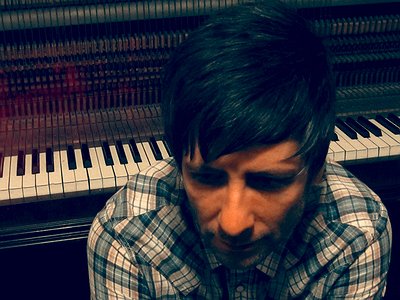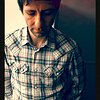Curious animals
The relationship between music and other forms of art – painting, video art and cinema most importantly - has become increasingly important. How do you see this relationship yourself and in how far, do you feel, does music relate to other senses than hearing alone?
Bringing different mediums together cohesively to help the participant identify your statement, message, idea is something I wholeheartedly indulge in. Visually, the latest release, Low Fantasy, plays with ideas further to connect and compliment the music that is etched in the vinyl. Symmetry features heavily in what I do; a lot of my music pieces are palindromes and rebound harmonically pretty much mid-way through the tracks – Low Fantasy is a clear example of this; the visuals anchor theses themes if you really seek out, detect and observe closely enough. It’s a game, of sorts. All the diverse elements and processes help the listener to organise, identify and interpret the environment the piece is trying to draw you into. The brain is actively attempting to understand the sensory input. Why would you not want to take advantage of the fact that we are, by default, curious animals? It also gives you a chance to collaborate with other artists. For me, it’s one of the most enjoyable aspects of the creative process.
There seem to be two fundamental tendencies in music today: On the one hand, a move towards complete virtualisation, where tracks and albums are merely released as digital files. And, on the other, an even closer union between music, artwork, packaging and physical presentation. Where do you stand between these poles?
I prefer to collect and release physical artefacts. I think somewhere along the way we lost the narrative of music by shuffling the hell out of it – like one of those anniversary clip shows, entertaining on a superficial level, but you're not getting the whole picture. I’ve downloaded, and I’ve shuffled, but engaging with the work in a physical and complete way brings so much more to the whole listening experience. It’s a clearer picture of the artists’ intention and state of mind during that period of time. I’m fascinated by sequencing and the choices we make as artists to translate an idea or story.
The role of an artist is always subject to change. What's your view on the (e.g. political/social/creative) tasks of artists today and how do you try to meet these goals in your work?
A lot of the people in my life have gained tremendously from the arts from the ground up. Most of us retain this as we get older – one way or another. I do think there is room for growth in terms of engaging young children and families with experimental music. Most of The Resource Centre’s heroes are within the walls of education: The Cults Percussion, Daphne Oram, Carl Orff. If I had any social orientated goal, it would be to try to make experimental music more accessible for families and children. To bring evocative music that’s so accessible in the city back in to the local community setting tailored for a unique demographic where you’re presenting to an age that doesn’t discern and is open-minded, curious. I’ve toyed with the idea of free monthly daytime experimental church to coincide with farmers’ markets for families to engage and participate with music and musicians, artists. Yes, donations, too!
Music-sharing sites and -blogs as well as a flood of releases in general are presenting both listeners and artists with challenging questions. What's your view on the value of music today? In what way does the abundance of music change our perception of it?
It’s a good question. I think this is why I’ve felt so compelled to restrict myself to just acquiring music on vinyl. I like to consider music. I like waiting for music. It changes the value of the product immensely. I’m physically engaged with the work – I could damage the work – I can’t afford another one. I don’t cherish downloaded music. It’s just not for me right now. I really admire its non-materialistic, affordable quality, and it really has its uses, but I want the full experience. I want everything – the whole concept. The sheer abundance of music that can be gained now for so little effort is overwhelming and worrying in terms of overlooking the good stuff. I’ve decided to create parameters to regulate my intake through plastic. I don’t want my art to be convenient. I want to wait – and savour – the music.
How, would you say, could non-mainstream forms of music reach wider audiences?
If your objective is to make an impression on the mainstream, there are certain rules you have to play by, and be very flexible about how you envisage your work. The Internet is oversubscribed and shows no signs of slowing down. I think there’s a lot to be said for live performance - to present your work , make a physical impression and build a reputation. If it’s interesting, it will cut through, if that’s what you really want.
Usually, it is considered that it is the job of the artist to win over an audience. But listening is also an active, rather than just a passive process. How do you see the role of the listener in the musical communication process?
I only want to win over the project. Again, it’s not about the audience; it’s not even about me – it’s all about the project. My main drive is to draw a response from the listener - to question what you are doing and how you are doing it. It's the desire to provoke a reaction – good or bad – it doesn’t matter to me; just to evoke a response, then you know you are doing something worthwhile.
Reaching audiences usually involves reaching out to the press and possibly working with a PR company. What's your perspective on the promo system? In which way do music journalism and PR companies change the way music is perceived by the public?
There certainly has been a shift in power – in terms of getting your music out there. I think the Internet potential is still in its infancy, but its impact on the industry in terms of the artist/label relationship is definitely a healthy one. Geographically, the ocean in which the promo system swims in is tiny in comparison to, say, 10-years’ ago when I first dipped my toe in. The danger, of course, is you have go deeper to find potential – but there is more potential. I’ve enjoyed being more proactive with my work and getting my hands dirty again trying to get it to the right people. PR is necessary and the hope is that you can just get a fan that can champion you. I think that’s the key. Music journalism and PR can change the way music is perceived by the public, but I think most people know the game and are savvy to what’s good. We’ve never been in a better place to make up our own minds.
Find John Hanson online at www.facebook.com/TheResourceCentre






